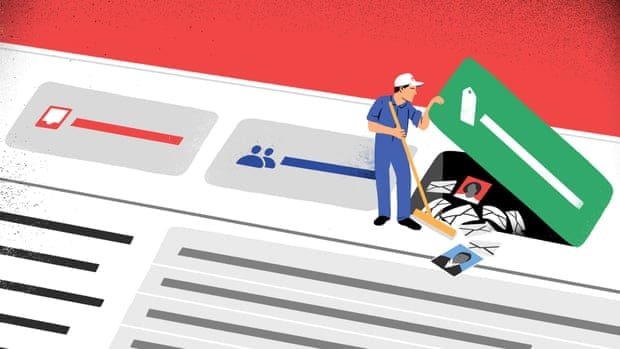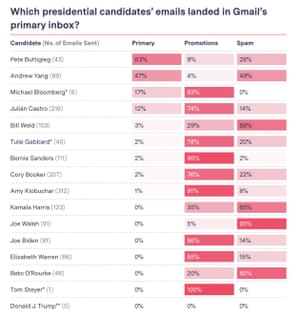
Is Gmail hiding Bernie’s emails to you? How inbox filtering may impact democracy
It’s known Facebook and Twitter customize news feeds – but a new report from The Markup reveals how Google’s email curation could have consequences in 2020
Pete Buttigieg is leading at 63%. Andrew Yang came in second at 46%. And Elizabeth Warren looks like she’s in trouble with 0%.
These aren’t poll numbers for the US 2020 Democratic presidential contest. Instead, they reflect which candidates were able to consistently land in Gmail’s primary inbox in a simple test.
The Markup set up a new Gmail account to find out how the company filters political emails from candidates, thinktanks, advocacy groups and nonprofits.
We found that few of the emails we’d signed up to receive – 11% – made it to the primary inbox, the first one a user sees when opening Gmail and the one the company says is “for the mail you really, really want”.
Half of all emails landed in a tab called “promotions”, which Gmail says is for “deals, offers and other marketing emails”. Gmail sent another 40% to spam.
For political causes and candidates, who get a significant amount of their donations through email, having their messages diverted into less-visible tabs or spam can have profound effects.
“The fact that Gmail has so much control over our democracy and what happens and who raises money is frightening,” said Kenneth Pennington, a consultant who worked on Beto O’Rourke’s digital campaign.
“It’s scary that if Gmail changes their algorithms,” he added, “they’d have the power to impact our election.”
It’s well known that Facebook and Twitter curate which posts people see through the news feed, highlighting some while others are scarcely shown. What’s received less attention is how email has also become an algorithmically curated and monetized platform – essentially another feed – and the effect that can have. Some nonprofits and political causes said inbox curation is reducing donations and petition signatures.
Google’s communications manager, Katie Wattie, said in an email that the categories “help users organize their email”.
“Mail classifications automatically adjust to match users’ preferences and actions,” she said. “Users really like the tab organization.”
Gmail enables the tabs by default, but they can be disabled. Wattie declined to say whether most users keep the tabs, but an email deliverability firm said about 34% of respondents to a 2016 survey said they use them.
The tabs also serve another purpose: ad inventory. While Gmail does not sell ads in the primary inbox, advertisers can pay for top placement in the social and promotions tabs in free accounts.

Some fear that, as a result, Gmail has the same conflict of interest that exists on social networks: if the platforms make it too easy to reach people for nothing, no one will buy ads.
“The worry is that they want to basically turn Gmail into a Facebook-style news feed where you have to pay for placement in the inbox,” said Ryan Alexander, a Democratic digital consultant.
Wattie, the Google spokeswoman, replied: “What you describe is not on our roadmap for Gmail.”
Gmail isn’t the only email provider offering sophisticated inbox curation. The premium $30-a-month email provider Superhuman sorts messages into “important” and “other”, while Microsoft’s Outlook sorts messages for its “focused inbox”. Outlook and Yahoo also sell ads in their inboxes in free accounts.
But with 1.5bn active email addresses and an estimated 27.8% market share, Gmail’s increasingly algorithmic inbox sorting has an outsized impact.
Nida Hasan, the director of Change.org in India, said she discovered in the spring of 2018 that the percentage of Gmail users opening her company’s emails had suddenly plummeted around the world, stalling petitions. In India, 90% of Change.org’s users are on Gmail, she said.
“There were a lot of really good campaigns which could not be mobilized or were stuck at a couple thousand signatures,” Hasan said.
Employees tested their own Gmail accounts and found that Gmail was sending Change.org emails to the promotions tab – even “forgot password” messages were winding up there.
A coalition of eight progressive advocacy groups in the US noticed a similar change at about the same time and said it suppressed donations and petition signatures. We reviewed email data provided by Democracy for America, CREDO Action and SumOfUs and found their Gmail open rates did drop that spring, by about 50% compared with email sent to subscribers using other email providers.
“We believe that our ability to inform and engage the public in political action, which we believe is fundamental to a healthy democracy, is being impeded,” the coalition wrote in a letter to Google in November 2018.
During a phone conversation the following month, a Gmail official offered them a suggestion to get more eyeballs on their emails: “You’re not precluded from buying an ad in the promotions tab, or offering a deal,” said Lee Carosi Dunn, who at the time led election sales, political outreach and policy for Google, according to notes taken by one person on the call. “Your type of users may be looking for deals too, some deal that involves fundraising or engagement.”
“We were appalled to hear…

















